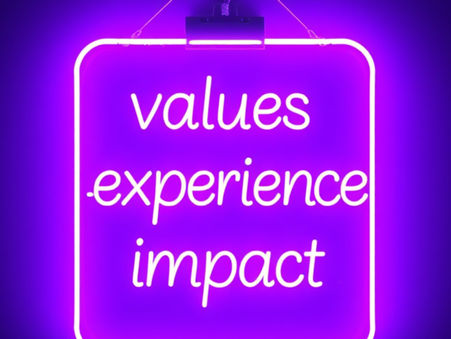
Articles
Want a quick hit of skills and knowledge? Have a few minutes to read an article?
This is the page for you.
You can also find more to inspire you in our shop.

Short Guides
Accountability in leadership
Leadership is ownership, so saying 'it wasn't me' when something goes wrong isn't an option. How do you take accountability without losing integrity? For years, I worked in an environment that was very highly scrutinised by our Board, external stakeholders, the media and the UK Parliament. When everything was going great, this was almost fun. When we weren’t doing so well, as happens inevitably from time to time, it was almost painful. As one of the public faces of the organisation it sometimes fell to me to face that scrutiny. I had the option of effectively saying ‘it wasn’t me’. It was unexpected external changes, system failings, things that were outside our control. It happened to us, rather than being done by us. I could even have outright blamed someone else. But it wouldn’t have convinced anyone. Accepting accountability in an honest and visible way is an essential mindset for a leader. Be specific, simple, honest and open to learning. Accepting accountability can be transformative for you and your team. It can also be really hard, especially when its in public. So, here’s a few lessons I’ve learnt about how to do it when you’re facing scrutiny. 1, Gather the evidence first. Make sure you know what your accepting accountability for and why. Be specific, and set data-led boundaries around the statements you should accept, and those you should not. 2. Keep your words simple and straightforward. Convoluted or technical explanations will sound like defensiveness even if you don’t mean them that way. 3. Remember the internal organisational audience. Act like your team, your Board, your organisation are all going to be watching (in my case they often were). 4. Learn, learn and learn. Then iterate and improve. You’ll need to rebuild confidence in your organisation so it’s best to avoid over-promising while being clear on the goal and the trajectory you intend to take. I wanted to protect my team - who I knew had done their best in every situation - but also to accept that improvements were needed. I found these simple principles to be powerful in every scrutiny situation so I could accept accountability without losing integrity.
Values-Driven Decisions
Ever wonder why some decisions feel right, and others leave you with a lingering sense of unease, even if they're "successful"? The answer often lies in your personal and professional values. For experienced leaders, understanding your values isn't just a philosophical exercise – it's a profound practical advantage. Here's why aligning with your values matters on a day-to-day level: 1. Clarity in decision-making: When faced with tough choices your values act as an internal compass. If "Integrity" is core, you'll naturally lean towards transparent, ethical paths. If "Growth" is key, you'll seek opportunities that stretch you. This saves time, reduces stress, and builds confidence. 2. Motivation and resilience: Think about the tasks you dread versus those that energise you. Often, the energising ones align with your deep-seated values. When your work actively reflects your values, it taps into intrinsic motivation, making challenges less daunting and setbacks easier to navigate. 3. Authentic leadership and influence: People are drawn to authenticity. When your actions, words, and decisions consistently stem from your core values, you build trust, command respect, and inspire others. 4. Finding fulfilment: Many experienced professionals are shifting from chasing external metrics to seeking work that brings deep personal satisfaction and benefits society. Your values are the blueprint for this fulfilling future. This is why at Raw Identity Coaching, our focus is on you finding harmony between your values and your work, building on your extensive skills and experience to find your unique route to achieving purposeful positive change.
Organisational Culture Wars
Organisational culture is set from the top, they say. I’ve been reflecting on culture recently, and the various refreshes of organisational culture I’ve been through at all stages of my career. Whether junior or senior, they always felt like a war. Why is that, especially when I was at the top? Within genuinely values-driven organisations your culture is always build on solid foundations. Which means that above ground you can go wild (within reason) with a heady mix of generations, lived experiences, backgrounds and styles. Yet, is that your experience? Below are five lessons I’ve learnt to blend the dynamism of change and the wisdom of experience into a rich soup of positive organisational culture. 1. Ask Why? Why? Why? Embrace the world’s most annoying repeated question to challenge assumptions and the ‘because we’ve always done it this way’ mindset. 2. Reset your XP. Get curious about things you think you already know to deepen your knowledge and follow new paths. 3. Disrupt disruption. Render self-proclaimed disruption obsolete by making disruption the norm through agile iteration and seeking change to improve. 4. Update your software. It’s not just about your IT infrastructure. It’s about exploring the new systems, processes and ways of thinking and delivering that new technology opens. 5. Learn quantum physics. Encourage thinking about the future in probabilities and ambiguities. These practical steps won’t turn around a toxic culture. But, as a senior executive who should be setting said culture, they provide practical ways to open the possibilities of how a great culture can be set.


Achieve Your ambitions through ethical goal-oriented coaching


Six Essential Ethical System Leadership Skills


Transformative Benefits of Executive Coaching for Leaders


Managing your decision backlog


Making Moral Decisions as a Leader


The Time Shift Mind Shift: Prioritise, Delegate, Stratigise, Create


You Have Two Choices: Influential Executive Communications


Keep up! The evolving value of a leader.


Why movement matters - so long as its movement your way


Redefine Success: Executive Coaching for Professionals
Articles
Why I like working in cafes
I accept this isn't a guide or an article, but sometimes sharing a perspective can spark creativity.
Working in cafes is a game changer for my productivity and well-being. The aroma of freshly brewed coffee, not to mention the one I'm sipping, awakens my senses, while the gentle hum of chatter keeps me energised and focused. The ever-changing scenery offers a delightful backdrop, sparking creativity or sudden burst of inspiration. And let’s be honest, who can resist the charm of people-watching while you tackle that to-do list? For me, the added factor of not having a playful kitten trying to bite my fingers while I type is also a major plus-point.
My point? Go somewhere different every once in a while and see where your thoughts take you. Encourage your teams to do the same. Variety, after all, is one of the foundations of innovation.